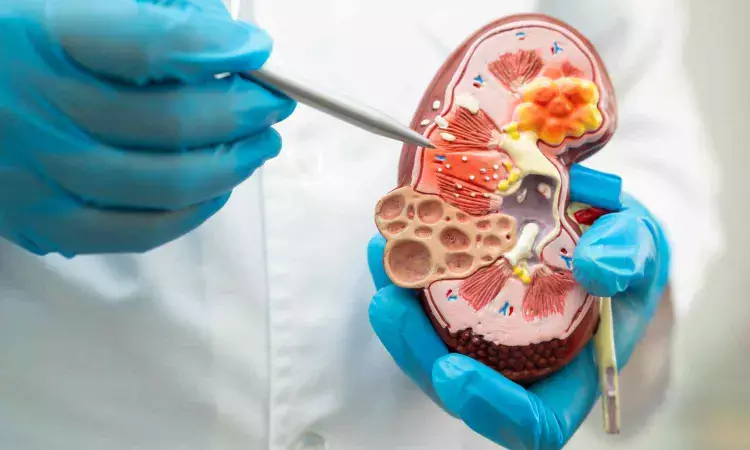- Home
- Medical news & Guidelines
- Anesthesiology
- Cardiology and CTVS
- Critical Care
- Dentistry
- Dermatology
- Diabetes and Endocrinology
- ENT
- Gastroenterology
- Medicine
- Nephrology
- Neurology
- Obstretics-Gynaecology
- Oncology
- Ophthalmology
- Orthopaedics
- Pediatrics-Neonatology
- Psychiatry
- Pulmonology
- Radiology
- Surgery
- Urology
- Laboratory Medicine
- Diet
- Nursing
- Paramedical
- Physiotherapy
- Health news
- Fact Check
- Bone Health Fact Check
- Brain Health Fact Check
- Cancer Related Fact Check
- Child Care Fact Check
- Dental and oral health fact check
- Diabetes and metabolic health fact check
- Diet and Nutrition Fact Check
- Eye and ENT Care Fact Check
- Fitness fact check
- Gut health fact check
- Heart health fact check
- Kidney health fact check
- Medical education fact check
- Men's health fact check
- Respiratory fact check
- Skin and hair care fact check
- Vaccine and Immunization fact check
- Women's health fact check
- AYUSH
- State News
- Andaman and Nicobar Islands
- Andhra Pradesh
- Arunachal Pradesh
- Assam
- Bihar
- Chandigarh
- Chattisgarh
- Dadra and Nagar Haveli
- Daman and Diu
- Delhi
- Goa
- Gujarat
- Haryana
- Himachal Pradesh
- Jammu & Kashmir
- Jharkhand
- Karnataka
- Kerala
- Ladakh
- Lakshadweep
- Madhya Pradesh
- Maharashtra
- Manipur
- Meghalaya
- Mizoram
- Nagaland
- Odisha
- Puducherry
- Punjab
- Rajasthan
- Sikkim
- Tamil Nadu
- Telangana
- Tripura
- Uttar Pradesh
- Uttrakhand
- West Bengal
- Medical Education
- Industry
Ostomy-Related AKI Linked to Higher Mortality and MAKE Risk, suggests study

Researchers have ascertained in a new study that Ostomy-AKI patients have more complex outcomes and higher mortality compared to General-AKI. The study draws attention to the fact that Ostomy-AKI is strongly associated with hypovolemia, more severe AKI staging, and a 2.5 times higher risk of major adverse kidney events (MAKE) at 30-90 days, including mortality, dialysis requirement, or severe kidney function decrease. The study was published in the journal of Kidney Medicine by Juan A. and colleagues.
Ostomies, made most often after cancer resections, can yield high fluid output, which puts patients at risk of dehydration and renal injury. The evidence from this study is crucial in identifying how such patients clinically differ from patients with AKI of other causes.
The retrospective cohort study was conducted at the Hospital Civil of Guadalajara between February 2020 and October 2023 and included 84 patients with ostomy-associated acute kidney injury (Ostomy-AKI) and 348 patients with general acute kidney injury (General-AKI). Ostomy-AKI patients were more frequently male compared to General-AKI patients (78.7% vs 56.2%), with a median interval of 2.3 months between ostomy formation and the development of AKI.
The primary indication for ostomy creation was cancer, accounting for 46% of cases. Clinically, patients with Ostomy-AKI had a mean ostomy output of 980 ml/day (range: 760–1700 ml), and 82.9% required fluid adjustment during management. The primary endpoints evaluated were major adverse kidney events (MAKE) at 10 days (MAKE10) and at 30–90 days (MAKE30–90), defined as death, initiation of new dialysis, or a ≥25% decline in estimated glomerular filtration rate (eGFR).
Key Findings
Etiology of AKI:
• Hypovolemia was more frequent in Ostomy-AKI (48.9% vs 24.5%)
Severity of AKI (Stage 3):
• Ostomy-AKI: 82.9%
• General-AKI: 63.9%
MAKE at 10 days (MAKE10):
• Both groups: 94% (no difference)
MAKE at 30–90 days (MAKE30-90):
• Ostomy-AKI: 65.9%
• General-AKI: 49.3%
• Mortality (30–90 days):
• Ostomy-AKI: 59.5%
• General-AKI: 37%
• Ostomy-AKI doubled the risk of death (OR 2.757, CI 1.273–5.973, p=0.01)
Risk of MAKE30-90:
• Ostomy-AKI increased the risk 2.4 times (OR 2.403, CI 1.090–5.299, p=0.03)
Compared to General-AKI, Ostomy-AKI patients have a greater frequency of hypovolemia, more severe AKI, and adverse long-term outcomes, such as 59.5% mortality and a 2.5-fold increase in MAKE risk at 30–90 days. The findings emphasize the importance of aggressive kidney care in patients after recent ostomy surgery to minimize the burden of kidney complications and promote survival.
Reference:
Dr Riya Dave has completed dentistry from Gujarat University in 2022. She is a dentist and accomplished medical and scientific writer known for her commitment to bridging the gap between clinical expertise and accessible healthcare information. She has been actively involved in writing blogs related to health and wellness.
Dr Kamal Kant Kohli-MBBS, DTCD- a chest specialist with more than 30 years of practice and a flair for writing clinical articles, Dr Kamal Kant Kohli joined Medical Dialogues as a Chief Editor of Medical News. Besides writing articles, as an editor, he proofreads and verifies all the medical content published on Medical Dialogues including those coming from journals, studies,medical conferences,guidelines etc. Email: drkohli@medicaldialogues.in. Contact no. 011-43720751


